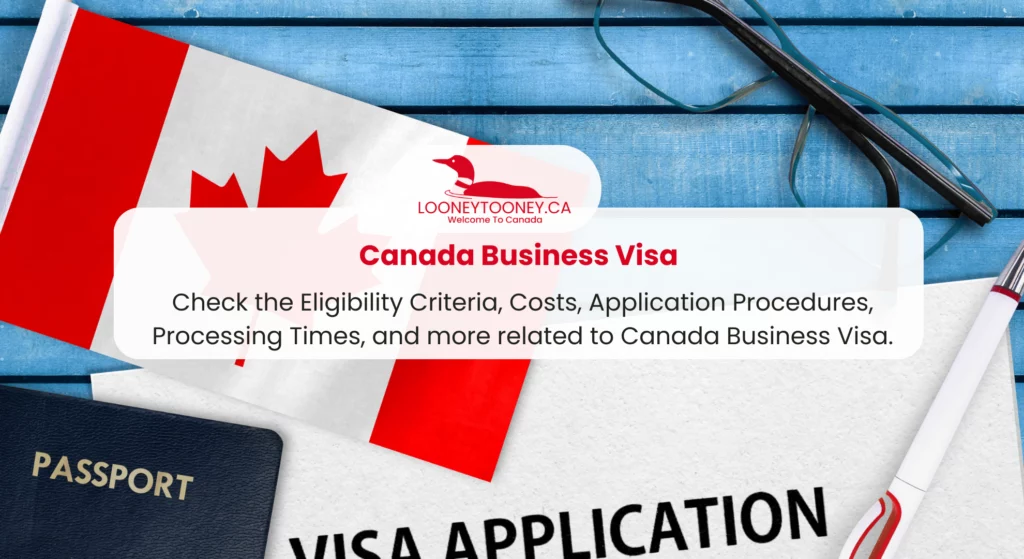In the year 2023, Canada stands out as a compelling choice for numerous foreign entrepreneurs, investors, and startup ventures. In response to this appeal, the Canadian government has established diverse business visa routes, offering pathways for foreign individuals to secure permanent residency in the country. This article serves as a comprehensive resource, providing the latest details on Canada business visa programs, encompassing information on requirements, costs, application procedures, processing times, and more.
Table of Contents
- What is a Canada Business Visa?
- Top Canada Business Visa Programs
- 1. Canada Business Visa for Intra-Company Transfer (ICT) Program
- 2. Canada Business Visa for Start-Up Visa Program
- 3. Canada Business Visa for C11 or Entrepreneur Work Permit
- 4. Canada Business Visa for PNP Business Immigration
- Canada Business Visa FAQs
What is a Canada Business Visa?
In 2023, there is a alot of Canada business visa programs, each designed to appeal to diverse categories of foreign investors. Rather than a one-size-fits-all approach, Canada offers various federal and provincial initiatives that enable individuals and their families to secure permanent residence in the country. These programs are specifically crafted to attract different forms of foreign investment and address the unique requirements of business immigrants.
Upon approval within a chosen program, entrepreneurs can actively manage their businesses in Canada under a work permit. Simultaneously, their families receive open work permits (for spouses) and study permits (for school-age children). Depending on the specific business visa program selected, individuals and their families can become eligible for permanent residence within a period ranging from 1 to 2 years.
This flexibility and tailored approach reflect Canada’s commitment to accommodating a diverse range of business immigrants and fostering economic growth through strategic immigration initiatives.
Top Canada Business Visa Programs
At present, Canada offers three federal and multiple provincial business visa initiatives. Here is a concise overview of each program
1. Intra-Company Transfer (ICT) Program
– Designed for businesses with established operations abroad seeking expansion into Canada.
– Despite the term “transfer,” this program involves expanding the business to Canada while relocating key personnel from the home country to oversee the new Canadian operations.
2. Start-Up Visa Program
– Suited for owners of operational start-ups with viable concepts and existing financial backing.
– Requires start-ups to secure a letter of support or investment funds from a designated Canadian organization.
– Applicants must demonstrate revenue generation, a clear business plan, and meet various other stipulated requirements.
– Available to start-ups, allowing up to five founders and their families to obtain permanent residency.
3. Entrepreneur Visa (C11)
– Tailored for those looking to purchase or invest in an existing Canadian business or initiate a new venture.
– Provides an avenue for foreign investors seeking to establish a new company in Canada.
– Eligible candidates, along with their families, may achieve permanent residency at a later stage.
4. Provincial Nominee Program (PNPs)
– Various provinces in Canada offer immigration programs catering to foreign entrepreneurs.
– With over 17 business immigration streams available, PNPs provide diverse options.
– However, for business immigrants, the suitability of PNPs varies, and federal programs might offer a more streamlined and efficient pathway.
This comprehensive list highlights the diverse opportunities available to foreign entrepreneurs and investors, emphasizing the unique features of each program to guide individuals in choosing the most fitting Canada Business Visa pathway for their goals.
1. Canada Business Visa for Intra-Company Transfer (ICT) Program
As a part of the International Mobility Program, the Intra-Company Transfer (ICT) stands as an immigration pathway that empowers eligible foreign business owners to transition their enterprises to Canada, securing a work permit in the process.
This trajectory not only facilitates the acquisition of an ICT Work Permit but also opens avenues for eventual permanent residence (PR). In the majority of cases, the principal applicant’s spouse is granted an open work permit, while children are eligible for a study permit.
ICT Canada represents just one facet of the diverse array of business immigration programs. By taking advantage of our complimentary instant assessment, individuals can gain insights into their migration options. Additionally, during our hour-long strategy meeting, our business immigration lawyers offer invaluable advice.
Intra-Company Transfer (ICT) Program Eligibility
The Intra-Company Transfer program was meticulously designed to entice well-established companies worldwide to expand their operations within Canada. This program extends its benefits to three main categories of individuals, business owners, entrepreneurs, and stakeholders holding executive positions in profitable enterprises, all with aspirations to thrive in the Canadian business landscape.
Eligibility encompasses senior managers and functional managers currently employed in foreign companies, desiring equivalent positions in Canada, as well as key personnel possessing advanced niche knowledge crucial to the company’s functions.
Apart from the aforementioned, individuals falling into these categories must satisfy various other prerequisites detailed below to secure a work permit under the ICT program.
Intra-Company Transfer (ICT) Program Requirements
Entrepreneurs overseeing successful enterprises in their home countries can pursue an Intra-Company Transfer (ICT) work permit to expand their businesses into Canada. Several prerequisites must be met to obtain a work permit through the ICT program, encompassing the following criteria
1. Company Establishment and Duration
– The company in the home country should have been operational for a minimum of 12 months, preferably three years, before initiating operations in Canada.
– The original company must exhibit financial stability, demonstrating the capacity to support external operations in Canada.
2. Employment History
– Individuals seeking an ICT work permit should have been employed in the original company for at least 12 months within the last three years preceding their immigration application.
3. Corporate Relationship
– The original company must have a recognized relationship with the Canadian venture, acting as a parent, subsidiary, or affiliate.
– Operations in Canada should be viable, contributing to job creation for Canadians.
4. Business Plan Assessment
– For companies venturing into Canada for the first time, immigration officers scrutinize the business plan.
– Evaluation includes determining the feasibility of operations in Canada, the potential for generating revenue to cover costs and employee salaries.
5. Job Creation and Operational Size
– Assessment is made on whether the expansion will lead to job creation for Canadian citizens.
– The size of operations in Canada should be substantial enough to necessitate the hiring of an executive or manager locally.
6. Investment Considerations
– While there is no mandated minimum investment amount, companies need to be financially robust.
– Adequate capital is essential to fortify new operations in Canada and facilitate the recruitment of local talent.
In essence, companies making their inaugural ICT application in Canada must not only meet the basic eligibility conditions but also present a compelling business case justifying the expansion. This involves showcasing the potential for success and significant growth, ensuring a substantial and positive impact on the local Canadian job market.
Step-by-Step Guide for Canada Intra-Company Transfer
Step 1. Register your company in Canada, designating it as a parent, subsidiary, or affiliate.
Step 2. Develop a comprehensive business plan outlining proposed activities, market research, and a profitable operational strategy in Canada. Include a recruitment plan and cash flow projections for the next two to three years, aligning with industry standards.
Step 3. Gather essential documents (e.g., articles of incorporation, bank statements, proof of investment funds) and prepare your work permit application.
Step 4. Submit your work permit application and await the decision.
Processing Time for Canada Intra-Company Transfer Visa
Standard processing times apply to ICT Work Permit applications, and applicants can verify specific timelines on the IRCC’s website corresponding to their country.
Duration of ICT Work Permits
– Typically granted for one to two years.
– Start-up firms utilizing the permit receive a one-year validity.
– Nationals from visa-exempt countries may obtain a three-year permit.
– Renewal options include additional periods of two to three years, allowing a total of up to five years for skilled knowledge workers and seven years for executives and managers.
Special Considerations
– Work permits for individuals employed by newly established companies may be limited to one year.
– US nationals and citizens from visa-exempt countries (e.g., UK, EU, Australia, Japan) benefit from Free Trade Agreements (FTAs) between their countries and Canada, securing a three-year ICT work permit.
– Under the program, a Work Permit can be obtained via a Labour Market Impact Assessment (LMIA) exemption (C12).
2. Canada Business Visa for Start-Up Visa Program
Canada’s Start-Up Visa Program provides a unique avenue for entrepreneurs seeking immigration to establish new businesses in the country. Immigrant entrepreneurs are required to showcase the originality of their business ideas, the potential to generate new employment opportunities for Canadians, and the capacity to compete on a global scale.
Requirements for Canada’s Start-Up Visa
To be eligible for this Canada Business Visa, aspiring entrepreneurs must fulfill four key requirements
1. Qualifying Business Ownership
– Hold a minimum of 10% of the voting rights associated with all shares of the company.
– Collaboratively, with the designated organization, possess at least 50% of the voting rights attached to all shares of the company.
2. Letter of Support from a Designated Organization
– Seek support from a designated organization, such as a venture capital fund, angel investor group, or business incubator.
– A successful pitch results in a letter of support from the organization, a crucial document for the Start-Up Visa application.
3. Meeting Language Requirements
– Undergo a language test administered by an approved agency.
– Demonstrate proficiency at a minimum Canadian Language Benchmark (CLB) level 5 in English or French across speaking, reading, listening, and writing.
4. Proof of Funds
– The required amount varies based on the family size and should be substantiated in the visa application.
| Number offamily members | Funds required(in Canadian dollars) |
| 1 | $12,960 |
| 2 | $16,135 |
| 3 | $19,836 |
| 4 | $24,083 |
| 5 | $27,315 |
| 6 | $30,806 |
| 7 | $34,299 |
| For each additional family member | $3,492 |
Investment Details for the Start-Up Visa Program
The Start-Up Visa program by Immigration, Refugees and Citizenship Canada (IRCC) engages several designated entities, including venture capital funds, angel investor groups, and business incubators. Successful applicants entering this program are mandated to secure a minimum investment for their Canadian start-up. Depending on the type of entity involved, the investment criteria vary—$200,000 from a designated venture capital fund and $75,000 from an angel investor group.
Notably, applicants need not secure a direct investment from a business incubator. However, acceptance into a Canadian business incubator program is a prerequisite.
Applicants are not obligated to invest their own funds. Importantly, if their Canadian start-up faces adversity, individuals holding permanent resident status through this program will retain their residency.
Evidence of Commitment
To substantiate support from a venture capital fund, angel investor group, or business incubator, the investor organization submits a completed Commitment Certificate directly to IRCC. This document outlines the agreement details between the applicant and the investment organization. Simultaneously, the applicant receives a letter of support from the investment organization, which must be included in the permanent residence application.
Support from Multiple Organizations
Applicants may receive support from multiple designated organizations, a process known as syndication. In such cases, all involved entities must be identified. They collectively provide IRCC with a single Commitment Certificate, and one Letter of Support is furnished to the applicant(s).
Peer Review Process
To safeguard the program against fraud, a peer review process is incorporated. This ensures the legitimacy of deals between investment organizations and foreign national entrepreneurs. Immigration officers may request a commitment to undergo independent assessment by a peer review panel established by industry associations representing the type of investment organization involved.
The peer review examines
– Incorporation of the company in Canada.
– Verification of business ownership complying with program requirements.
– Assessment of the proposed business model’s viability, scrutiny of the management team, and verification of intellectual property ownership.
– Focus on a high-growth potential product and/or service.
– Validation of acceptance into an incubator program for business incubator applicants.
While not binding on immigration officers, the peer review confirms that the investment organization adhered to industry standards in due diligence and assessments. It does not provide an opinion on the wisdom or feasibility of the proposed business.
How to Submit a Start-Up Visa Application?
Step 1. Fill out the Application Form
– Complete the Generic Application Form for Canada.
– Click the “Validate” button to ensure all required fields are filled.
– Print the validated form, including the barcode page.
– Sign and date the form.
Step 2. Complete the Document Checklist
– Gather all required documents in the order specified in the document checklist.
– Place all necessary documents in a sealed envelope.
– Print and sign the document checklist.
– Include the signed document checklist as the cover page of your application.
Step 3. Pay Your Application Fees
– Application fees cover processing fees for both the applicant and any included individuals.
– Include the right of permanent residence fee.
– Account for third-party fees, such as those for medical exams, police certificates, and language testing.
– Consider biometrics fees as part of the application process.
| Type of Applicant | Cost |
| Individual applicants | $85 CAD |
| Families applying together | Maximum total fee of $170 CAD |
| Groups of 3 or more performing artists and their staff | Maximum total fee of $255 CAD |
Step 4. Submit your application
– Pay the necessary processing fees.
– Include the receipts for the fees in your application.
– Ensure all supporting documents are included.
– Place all documents in a 9” x 12” envelope.
– Send your application package to the designated address.
Processing Time for Canada’s Start-Up Visa
The current processing time for the Start-Up Visa is approximately 31 months. Keep this timeframe in mind as you plan your immigration process.
3. Canada Business Visa for C11 or Entrepreneur Work Permit
The Entrepreneur Work Permit, designated as C11, falls under the purview of the International Mobility Program (IMP). This program opens avenues for foreign entrepreneurs and investors to secure a work permit in Canada as self-employed individuals. Typically, the initial work permit is granted for a duration of two years, and subsequent extensions are possible, contingent upon the sustained activity and profitability of your business in Canada. Entrepreneurs and business owners operating under the C11 work permit may, over time, become eligible for permanent residence in Canada.
Who Should Apply for the C11 Entrepreneur Work Permit?
The C11 work permit is well-suited for the following groups of individuals
1. Self-employed individuals aspiring to initiate a business in Canada.
2. Entrepreneurs seeking to purchase a business or franchise in Canada.
3. Individuals chosen through the Entrepreneur streams of Provincial Nominee Programs.
4. Startup founders who have submitted their Permanent Residency (PR) application under the Startup Visa Program.
For those contemplating the C11 work permit, a successful application necessitates convincing the immigration officer of the following
1. Ownership and Shareholding You own your business or hold a majority share (at least 50%) in the business in Canada.
2. Relevant Experience and Capacity Possession of relevant experience and capabilities to effectively operate the business in Canada.
3. Financial Capacity Demonstrated financial capacity to execute the proposed business plan.
4. Feasible Business Plan A viable and implementable business plan.
5. Progress and Implementation Execution of significant steps toward implementing the business plan.
6. Significant Benefit to Canada Assurance that your business will generate a “significant benefit to Canada.”
Step-by-Step Guide for the C11 Entrepreneur Work Permit
Step 1. Start or Invest in a Business Consult with a lawyer before initiating or investing in a business in Canada to ensure it aligns with program requirements.
Step 2. Research and Craft a Comprehensive Business Plan Your business plan is crucial, serving as the foundation for your application. Provide detailed information, including your business model, hiring plan, and pricing strategy, to convince immigration officers of its viability.
Step 3. Develop and Implement an Execution Plan Showcase your commitment by taking initial steps to execute your business plan. Mere financial transactions may not suffice; demonstrate tangible actions aligned with your business strategy. At Sobirovs, we assist clients in developing cost-efficient and swift execution plans.
Step 4. Prepare and Submit the C11 Work Permit Application
– Collect evidence of your commitment and execution of the business plan.
– Submit the work permit application under the C11 LMIA exemption code, including relevant documents such as entrepreneurial or managerial experience, financial statements, and support letters.
Step 5. Await Application Approval
– Expect a decision from the IRCC approximately 1-3 months after submission, contingent on providing biometric information if required. In case of a positive decision, plan your trip to Canada; if negative, consult your lawyer for a strategy to challenge the decision.
Step 6. Arrive in Canada and Operate Your Business
– Upon approval, a 2-year work permit is issued by the CBSA officer upon arrival.
– Work exclusively for your business; your spouse typically receives an open work permit.
– Operate your business for a minimum of 12 months before becoming eligible for permanent residence.
4. Canada Business Visa for PNP Business Immigration
Embarking on business ownership and expansion in Canada becomes an attainable reality for entrepreneurs leveraging the Business Immigration Provincial Nominee Programs (PNPs). Typically, entrepreneurs need a robust financial business plan to articulate the development of their business, disclosing their net worth, and specifying the capital earmarked for injection into the provincial economy.
A net worth of CAD $250,000 commonly enhances an entrepreneur’s PNP points, contingent on the chosen province for relocation. Moreover, relevant work experience in managing a business within the same category can significantly bolster your application.
While PNP programs stand out as sought-after immigration pathways in Canada, they may not always represent the fastest or most optimal route for every individual. It is highly recommended to explore alternative programs such as the Intra-Company Transfer program, Entrepreneur Work Permit program, Canada’s Start-up visa program, or LMIA work permits to find the most suitable immigration avenue.
Eligibility Criteria for PNP Business Immigration Programs
To qualify for any PNP business immigration program, applicants must meet specific criteria designed to ensure the viability and contribution of their business endeavors to the local economy. The key eligibility requirements include
1. Comprehensive Business Plan
– Creation of a detailed business plan outlining the nature of the business to be purchased or established.
– Inclusion of meticulous financial projections demonstrating the positive impact on the local economy and labor market.
2. Business Management Experience
– Demonstrated business management experience is a universal requirement.
– Some provinces specify a minimum of 2 to 5 years of full-time experience, while others emphasize the requirement without imposing specific minimums.
3. Active Participation in Business Management
– Involvement in the day-to-day management of the business is mandatory.
– Some programs may necessitate a performance agreement with additional benchmarks or requirements.
4. Additional Selection Criteria
– Each program includes additional selection criteria, ranging from language proficiency to age requirements.
5. Government Deposits
– With the exception of Ontario & Quebec, most PNP business immigration programs either have optional or mandatory government deposits.
– These deposits ensure applicants fulfill the committed investment outlined in their application.
Minimum Requirements for Canada Business Visa for PNP Business Immigration
Below is a table that illustrates the differences in the various PNP business immigration programs.
| Province | Minimum Net Worth | Minimum Investment |
| British Columbia | $800,000 CAD [Vancouver and Abbotsford area]$400,000CAD [Outside Vancouver and Abbotsford area] | $400,000 CAD and ownership in more than 33.33% of the business [Vancouver and Abbotsford area]$200,000 CAD and ownership in more than 33.33% of the business [Outside Vancouver and Abbotsford area] |
| Manitoba | $350,000 CAD | $150,000 CAD and ownership in more than 33.33% of the business,OR $1,000,000 CAD |
| Saskatchewan | $300,000 CAD | $150,000 CAD and ownership in more than 33.33% of the business,OR $1,000,000 CAD |
| Ontario | N/A | $3,000,000 CAD and ownership in more than 33.33% of the business,OR $1,000,000 CAD |
| New Brunswick | $300,000 CAD | $125,000 CAD |
| Prince Edward Island | $600,000 CAD | $150,000 CAD and ownership in more than 33.33% of the business,OR $1,000,000 |
| Yukon | $250,000 CAD [minimum $150,000 CAD in liquid assets] | $150,000 CAD and ownership in more than 33.33% of the business,OR $1,000,000 CAD in an industry on the Strategic Sectors List |
| Northwest Territories | $500,000 CAD [if business is in Yellowknife]$250,000 CAN [if business is outside of Yellowknife] | $300,000 CAD [if business is in Yellowknife]$150,000 CAN [if business is outside of Yellowknife] |
Canada is a welcoming country for business travelers, offering a variety of business visa options to suit different needs. Whether you are attending a conference, meeting with clients, or exploring potential partnerships, a business visa can allow you to conduct your business activities in Canada without taking on employment.
The application process for a business visa is relatively straightforward, but it is important to carefully review the eligibility requirements and documentation required.
Here are some tips for increasing your chances of success in your business visa application:
- Be prepared to provide evidence of your business activities in your home country.
- Explain the purpose of your visit to Canada in detail.
- Show that you have sufficient funds to support yourself during your stay.
- Demonstrate that you have strong ties to your home country and that you intend to return once your visa expires.
If you are planning to visit Canada for business, be sure to apply for a business visa well in advance of your trip. This will give you enough time to gather the required documentation and complete the application process.
Canada Business Visa FAQs
Q. How might I get a Canada Business Visa?
A. To get a Canada Business Visa, you should pick and apply to one of the speculation migration programs. Each program has its prerequisites and is custom-made to a particular kind of unfamiliar venture.
Q. What are the Financial Requirements for a Canada Business Visa?
A. The adequacy of your investment is assessed based on its viability for sustaining your Canadian business operations. The amount required varies depending on your business type. For instance, $150,000 might suffice for starting an e-commerce venture, while a delivery business could necessitate an investment exceeding $350,000.
Q. Does Owning a Business Grant a Canada Business Visa?
A. Merely owning a business in Canada does not automatically grant you a visa or residency rights. However, owning a business positions you to potentially qualify for a business visa through specialized business immigration programs. These programs may provide a work permit, allowing you to operate your business and reside in Canada with your family.
Q. Can I get a Canada Business Visa if I buy a business?
A. Buying an existing business in Canada offers a viable immigration pathway for foreign investors and entrepreneurs. Whether you invest in an existing business, purchase one, or opt for a franchise, various immigration options are available. Potential routes include the C11 Entrepreneur work permit, Intra-company transfer, or other applicable programs.
Also, read:
- A Comprehensive Guide on Different Immigration Programs for Canada
- Spouse Open Work Permit Canada: Work Alongside Your Spouse
- PR Canada: Benefits, Eligibility, Application Steps & More
- Self-Employed Program: A Step-by-Step Guide to Permanent Residency
- Rural and Northern Immigration Pilot: A Pathway to Canadian Residency
- Visitor Record in Canada- Extend Your Stay & More





